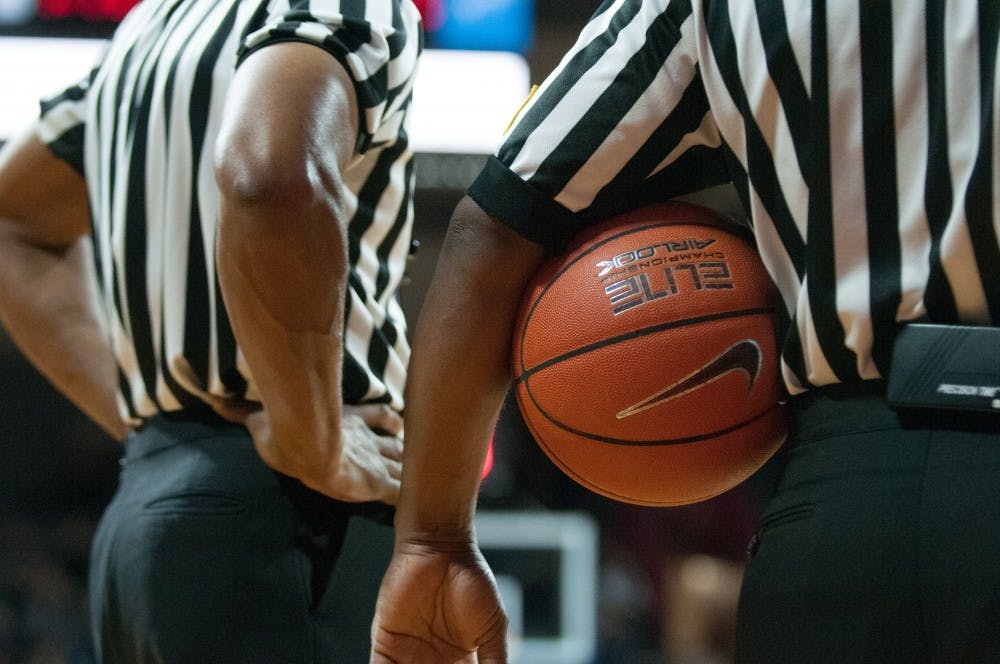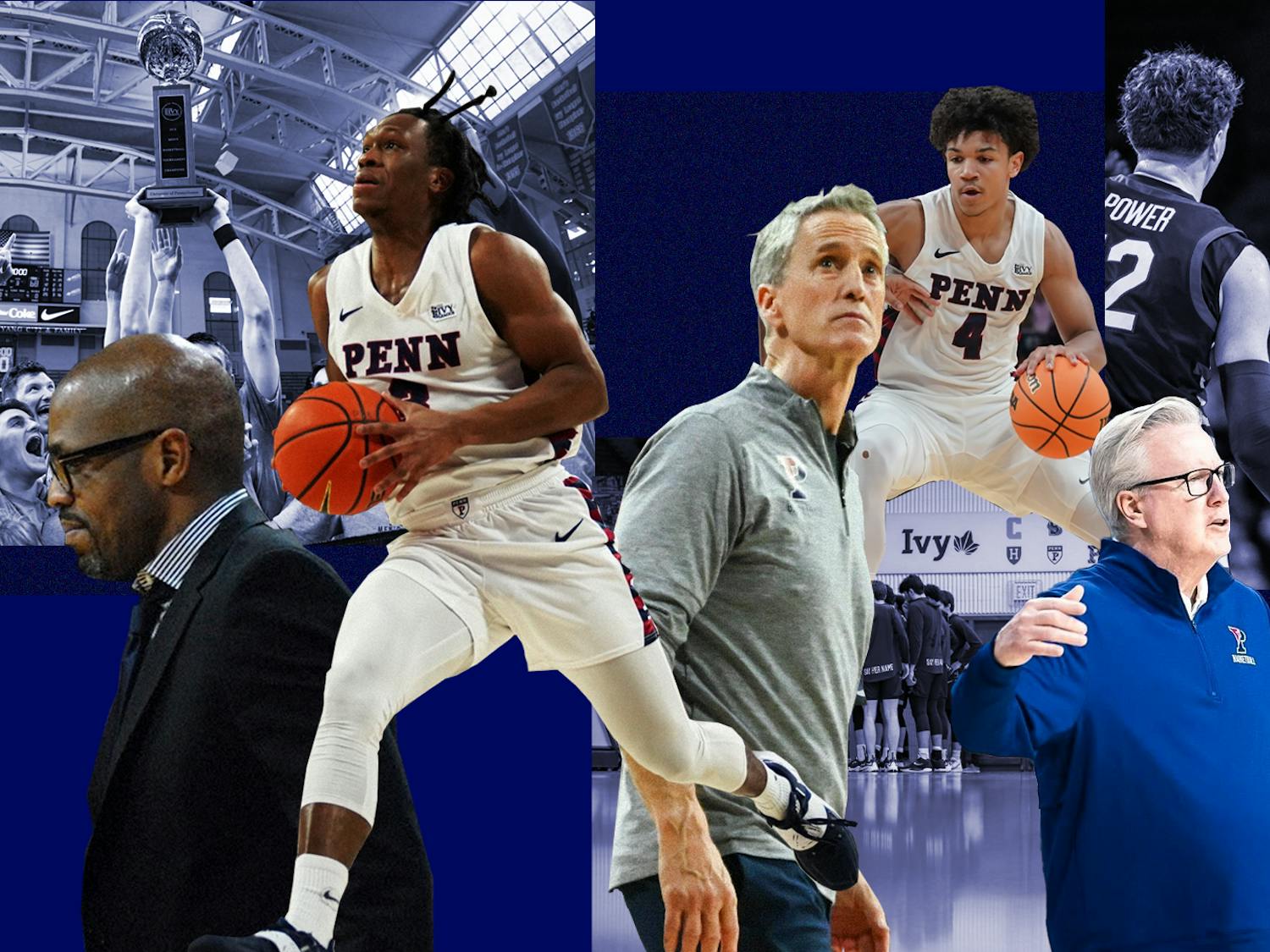It's early on a Saturday morning. While you're asleep, Garrett Colvin is hard at work.
He’s taken on the responsibility of being one of the few, the proud, the Penn basketball managers.
Student-managers are a rare breed. Seldom seen or heard, they’re the unsung, behind-the-scenes heroes of the basketball program, without whom the team could simply not be successful.
The work? It’s unpredictable and often thankless. Managers are tasked with anything from setting up equipment to coordinating food orders to mopping up the players’ sweat. They must be ready to solve problems on the fly, as well as follow orders deferentially and without question. Translation: big egos need not apply.
Well, the pay must be good, right? Nope, it's nonexistent. This job necessitates a special sort of applicant: motivated, dedicated and passionate about the game.
“I by no means think of it as me working for someone. I think of it as me just being a part of the team, and I think that’s a testament to how the coaches and the players treat us,” Colvin said. “It’s fun for me to get to the gym an hour early and help the players shoot, and it’s fun for me to stay an hour afterwards to help with any logistical stuff that the coaches might need. Just knowing that you’re playing a role in something bigger than yourself always makes it all worth it.”
“Sometimes there are things you are asked to do that you don’t necessarily want to do, but you do them,” said Joseph Cesare, a senior who has been with the team since the fall of his freshman year. “At the end of the day, it’s because you’re all going for this common goal.”
Colvin and Cesare’s selfless attitude seems to be universal; the managers fall in love with being part of this team.
People are initially drawn to the position, though, for many different reasons. Some, like Cesare, simply enjoy being involved with a sport they love. “This is what I do for fun,” he says. Others are ex-players, looking to help out with a program that has become a part of who they are at Penn.
Jameira Johnson, a sophomore, is one such manager on the women’s team.
“Earlier this year, I made the decision to contribute to the team in the best way that I could,” she said. “For me, that was changing my role to be off the court and more behind the scenes. I love my teammates and my coaches and I do whatever I can to better our program."
Many managers, alternatively, see a future for themselves in the sports management industry down the road. The program has many students, Wharton or otherwise, who are interested in a career in sports management or coaching.
“I grew up a big Penn fan, so to be part of the program is a privilege," Austin Rahmin, a sophomore in his first year with the team, said. "Brad and the coaches really do a great job making us feel part of the team, and for me this is kind of what I want to do with the rest of my life. My dream one day is to go into coaching, and there’s no better place to learn than from these coaches. They’re amazing.”
The “Brad” to whom he’s referring is Brad Fadem, the director of operations for the men's team who is closely involved with the process of hiring and recruiting managers.
“The matriculation [to careers in the industry] is pretty high, and when I meet with our potential managers for the first time I tell them: if you’re looking to get into athletics, whether college or professional, this is a great opportunity," Fadem said.
Before starting at Penn, he was a student manager at Boston College, under the leadership of, you guessed it, current Penn head coach Steve Donahue.
“Look, I thought so much of him that when I got this job, he was my first call, for the [director of operations] position," Donahue said. "The good ones really stand out.”
Hiring Brad wasn’t some sort of anomaly. The trust between a coach and his managers is built up slowly, day by day. The bond they form is something special, something sacred and something that can last a lifetime; Donahue’s 1993-94 team manager is his accountant to this day.
“The hierarchy is this: the coaches, the managers, and then the players,” Donahue said as he moved his hand from his head, to his chest, to his waist. “I think it’s important to understand how important the managers are to us. They’re very important, the players respect them, and we’re very grateful for everything that they do.”
It’s the way it’s always been.
The legacy of the manager at Penn goes back further than you’d think. Here’s a little-known anecdote: in the late 50’s, while serving as a student manager during his undergraduate years, Jon Huntsman Sr. actually suited up during a road game against Cornell. After one player fouled out and two others were injured, the Quakers, who began the game with an already-depleted seven-man lineup, were hopelessly shorthanded.
The team put in Huntsman, who soon after got into a scuffle over the ball and promptly went to the line. He knocked down one glorious free throw, the bench went nuts, and Huntsman would go on to describe it as his greatest experience at Penn.
NCAA rules have changed quite a lot since those days. In particular, crackdown on player eligibility standards would prevent such history from ever repeating itself at a premier Division I program like Penn.
“That would be… that’s never gonna happen,” Rahmin laughed. “I certainly speak for myself and all of us when I say that we would do anything to help this program. Not playing in the game, though, that would never happen.”
Colvin and Cesare, sitting on either side of Rahmin, immediately leaned forward to share a grin with each other.
“What Austin’s not telling you,” Cesare said, “is that every day…”
“Every. Day.” emphasized Colvin, interjecting.
“Okay I guess we’re going there,” said Rahmin, a little red in the face.
Cesare continued. “Every day, he’ll come into the gym and just talk about how he daydreams about that all the time. And we all just shake our heads and are like ‘Austin… come on man.’”
“Yes, fine, so yes,” Rahmin laughed, “I would play in a game if they needed me.”
“If you were the first choice,” Colvin ribbed.
It’s certainly not an absurd concept. Back in 2009, when Donahue was the head coach at Cornell, a freshman from Tampa, Fl. named Jonathan Gray wanted to play for the team. Donahue didn’t see it happening, but was impressed with the kid’s passion for the sport so he suggested that he come on as a manager instead.
Soon, he was playing regular pickup basketball at lunch with the coaches, and Donahue eventually offered him a roster spot. By his senior year, he was All-Ivy, and today, he’s playing on the U.S. Virgin Islands national team.
Penn’s managers are a committed group of individuals who do a great deal for our basketball teams and ask very little in return. The next time you find yourself down at the Palestra for a home game, take a moment to watch the men and women standing at attention behind the bench. Take a moment to acknowledge those whose dedication to the team, and whose hard work when no one is watching, makes it all possible.









